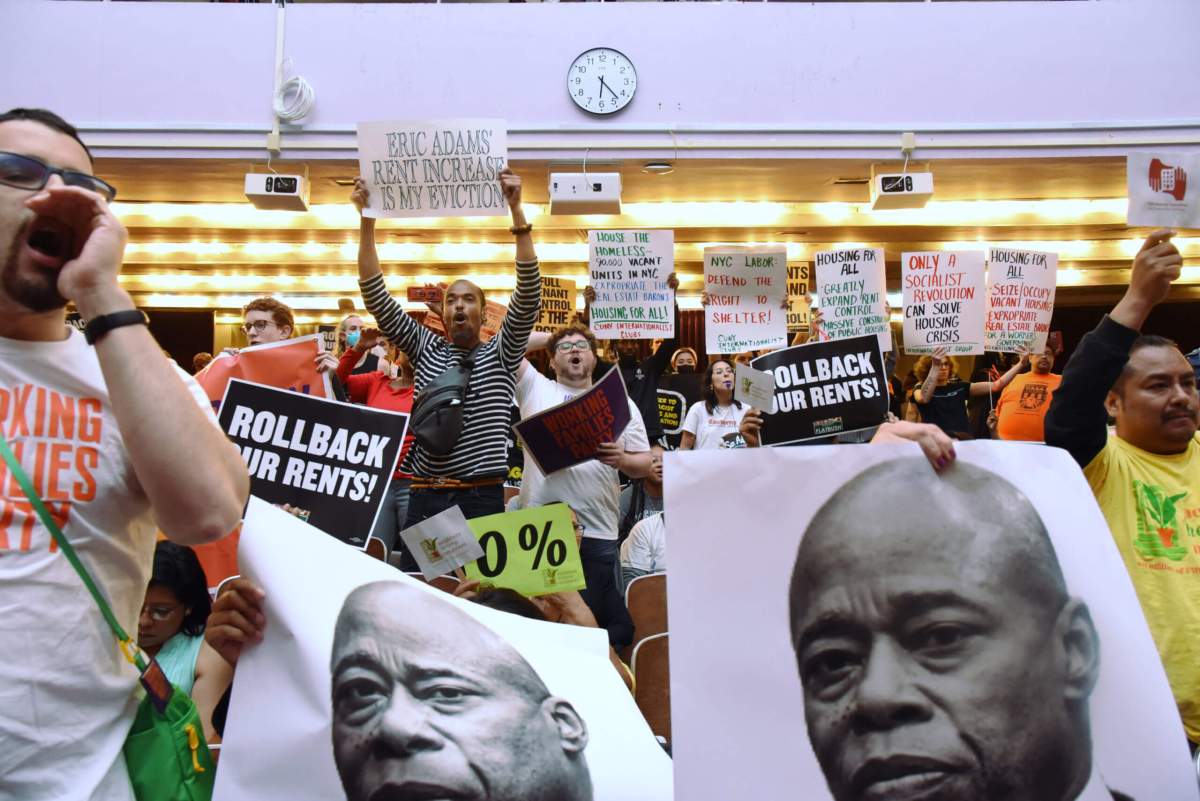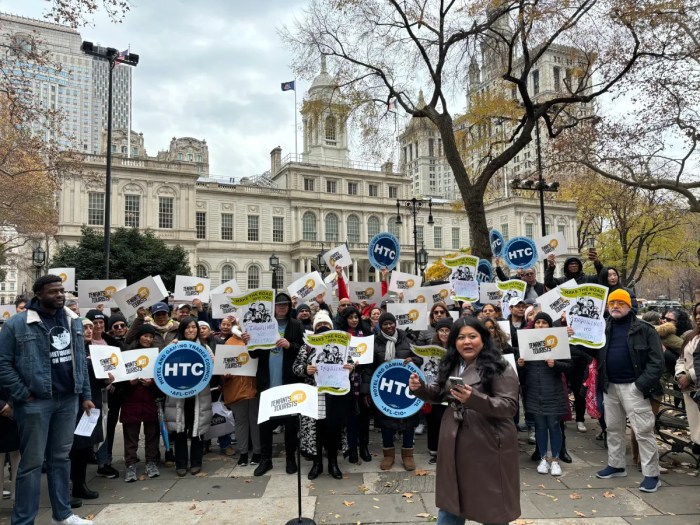Queens Borough President Donovan Richards is calling on all levels of government to make affordable housing and the overall livability of New York City its top priorities after the Rent Guidelines Board (RGB) voted on Wednesday, June 21, to authorize increases on rent-stabilized apartments across the five boroughs.
Demonstrators were gathered at Hunter College in Manhattan for the board’s final vote, which resulted in a 5-4 decision for a 3% increase for one-year leases for people living in rent-stabilized units. The board also upped two-year leases by 2.75% for the first year and 3.2% for the second year.
The increases apply to new leases signed after Oct. 1 of this year for rent-stabilized apartments. The board’s vote comes after months of deliberations and contentious meetings with the public.
“Tonight’s Rent Guidelines Board vote to raise the rents of hard-working families is wildly out-of-touch with the pressing needs of our city — currently in the unprecedented midst of simultaneous housing, homelessness, migrant and eviction crises. Such a move will undoubtedly lead to more displacement, more uncertainty and more families falling through the cracks of our society,” Richards said.
Tonight’s Rent Guidelines Board vote to raise the rent on countless hard-working families couldn't be more out-of-touch with the pressing needs of our city — currently in the midst of simultaneous housing, homelessness, migrant and eviction crises.
A thread on what's next🧵… https://t.co/NdUUFgkYby
— Queens Borough President Donovan Richards (@QnsBPRichards) June 22, 2023
The borough president is calling on the city to immediately increase its financial commitment in the short-term to ensure New Yorkers facing eviction can easily access free legal services under the Right-to-Counsel law and in the long-term by greatly expanding the affordable housing stock.
“Meanwhile, the state must act now to pass Good Cause Eviction legislation, to address the looming 421-a deadline and to reform the program as is,” Richards said. “It is deeply unfortunate the Rent Guidelines Board has opted to be an obstacle in the path of progress. But here in Queens, revolutionary new affordable housing projects from Far Rockaway to Jamaica to Astoria are coming online, with thousands more affordable units in the works.”
Richards echoed these sentiments during the RGB public hearing held in Jamaica on June 14, where Queens residents sounded off on the proposed rent hikes.
Meanwhile, City Council Speaker Adrienne Adams said the Rent Guidelines Board’s vote to authorize rent increases, while on the lower end of the proposed ranges, will only further exacerbate the homelessness and housing crisis in communities at a time when New Yorkers can least afford it.
“As our city grapples with a record-high shelter population, an affordable housing shortage that remains unabated, and rising costs, New York City tenants increasingly struggle to make ends meet,” Adams said. “This will harm our communities, deepen the lack of affordability, and make it even more difficult for New Yorkers to remain in their homes and work in the city they love.”
Adams noted that while action on housing is needed at the state level, there are steps the city should take to address evictions, homelessness, and housing on its own. The council speaker said there has been “inadequate intervention” by the administration as evictions skyrocket and the mayor’s budget lacks the housing investments needed in the city to protect New Yorkers.
“These rent increases will only fuel our housing crisis unless the city budget invests in housing solutions that prevent evictions and homelessness and ensures city agencies are supported to advance them. We urge the mayor to join the Council in supporting housing investments being added to the budget,” Adams said.
In May, the board voted to consider increases between 2% and 5% on one-year leases, and 4% and 7% on two-year leases. It’s the second consecutive year that the board has increased rents by at least 3% under Mayor Eric Adams.
Last year, the Rent Guidelines Board approved a 3.25% increase on one-year leases and a 5% increase on two-year leases for rent-stabilized apartments.
Adams, who appointed most of the nine-member panel, issued a statement praising the board for their “critically important and extremely difficult work protecting tenants from unsustainable rent increases, while also ensuring small property owners have the necessary resources to maintain their buildings and preserve high-quality, affordable homes for New Yorkers.”
“Finding the right balance is never easy, but I believe the board has done so this year — as evidenced by affirmative votes from both tenant and public representatives,” Adams said. “We also know that the real solution to the affordable housing crisis requires building more housing — that means getting New York City the tools we need to build the housing New Yorkers deserve. That is why we continue to fight for state action on affordable housing incentives, office conversions, and other key priorities. And we are using every tool in the city’s toolkit to build more housing more quickly — cutting red tape, making the largest financial commitment to affordable housing in the city’s history, and advancing a ‘City of Yes’ zoning amendment that will clear the way for new housing in every borough.”
While nearly half of all New Yorkers are unable to make ends meet due to the cost of living, rising food prices to utility bills and transportation costs, the Legal Aid Society said more people will themselves be displaced from their homes and communities onto the streets or in local shelters.
“As detailed in a report issued by Board staff this past April, the majority of tenants in rent-stabilized units are already significantly rent burdened. Moreover, another recent report revealed that New York City is in the midst of the worst affordability crisis of the last two decades,” said Adriene Holder, chief attorney of the Civil Practice at The Legal Aid Society and former tenant member of the New York City Rent Guidelines Board.
Holder said the willful increase from the RGB is “both immoral and bad policy” that will “deepen the local homelessness and eviction crisis that Albany and City Hall seem unable and unwilling to even address.”
“For years, landlords enjoyed rubber stamp increases from the Board, and these continued hikes will bear devastating consequences on the New Yorkers most in need of assistance, care and a place to call home,” Holder said.



































